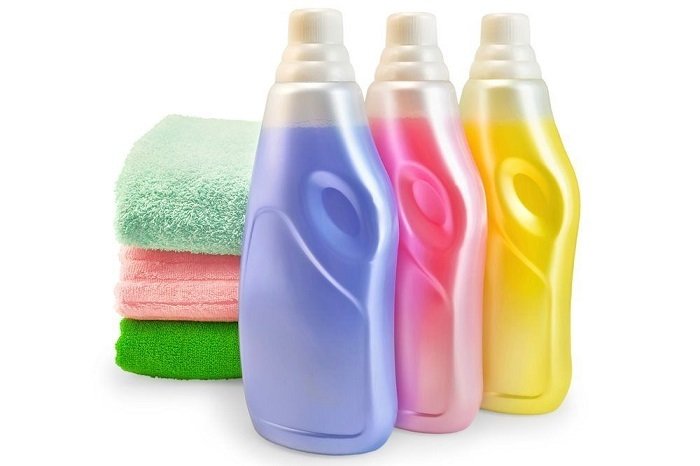
In today’s world, there are many arguments as to whether or not fabric softener is bad for you. We have all been provided with this notion that fabric conditioner is a necessity to ensuring the best-washed clothes.
In this article, we are going, to sum up, the advantages and disadvantages of using fabric conditioner in order to answer the following question: is fabric softener bad for you?
What Is Fabric Softner?
Fabric softener is a combination of chemicals that are used to coat the surface of clothes with a thin layer of lubrication.
The aim of the fabric conditioner is to make clothes feel smoother and helps them resist the build-up of static electricity.
There is an array of fabric softener makes available to you:
- Downy
- Beads
- Snuggle
- Gain
- Tide
- Cuddly
- Swavitel
- Optimo.
Fabric softener comes in many different forms including:
- Pellets
- Crystals
- Bars
- Single-dose packs
- Liquid
- Gel
Should I Use Fabric Softner?
Fabric conditioner is a great way to soften your clothes which ultimately makes your clothes feel more comfortable to wear.
The benefits of using fabric softener include:
- Making your clothes less harsh
- Making your clothes less scratchy
- Makes your clothes smell phenomenal
The Benefits of Using Fabric Softner
Apart from the above list, there are many more benefits of using fabric softener when it comes to washing and cleaning your clothes:
- Fabric conditioner is a great way to keep your clothes looking newer for longer;
- Fabric softener keeps clothes materials such as wool in perfect conditioner;
- Fabric softener softens the fibers of the material to help make them smooth;
- Maintain clothes’ elastically;
- Fabric conditioner helps to reduce creases in the material;
- Fabric conditioner adds a great scent to your clothes, allowing your clothes to have a fresh smelling feel to them all day every day.
But What are The Disadvantages? Truly, Is Fabric Softener Bad For You?
Like the title of this article suggests, there is a huge debate as to whether fabric softener is actually good for you.
Fabric softeners are often packed with chemicals which affect your health. This is something that almost everyone is completely oblivious too. Not only that, but the chemicals found in fabric softeners can also have effects on the environment via polluting the air in both the home and outside.
Why Should You be Avoiding Fabric Softner?
There is a lot of research about, particularly from health experts and organizations, that suggest that people should be skipping the fabric softener stage of washing and cleaning clothes.
The fabric softener that you are using could contain lots of different phthalates which are nasty chemicals being instilled in your clothes.
Below we have also outlined a few other reasons as to why fabric softeners should be avoided:
- QUATS = Quats, or quaternary ammonium compounds are chemicals used to make your clothes feel softer and more wearable. These chemicals are known to trigger asthma attacks and are thought to have a toxic implication to reproductive systems.
- FRAGRANCES = As mentioned, phthalates are often chemicals found in fabric softeners
- PRESERVATIVES AND COLOURS = preservatives and colorings are often used in fabric softener. Again, this contains hazardous chemicals such as methylisothiazolinone.
Hopefully, the above list gives you some indication that fabric softener is not all that it is cracked up to be. Instead, there are lots of chemicals end ingredients added to the fabric softener to do its intended job. However, what many people fail to realize is the added consequences of using such products.
Alternatives to Using Fabric Softner
You might be thinking if I stop using fabric softener, what is going to make my clothes smell good? Well, there are many alternative methods that you can try out in order to substitute your fabric softener for a more safer and eco-friendly product.
Below we have included a few ideas that you can use to trial and error to find the right method for you:
- Add half a cup of distilled white vinegar to your washing during the rinse cycle. Your clothes will not smell like vinegar, but they will provide that soft feeling.
- Tumble drying your clothes (not too much) can help reduce crease lines and add an extra softness to them. Just remember that this can backfire if you leave your clothes drying for too long, or leave them in too long after the cycle has ended.
- Another alternative is to use 100% wool dryer balls. These are a great way to soften clothes and reduce any static between materials. This is also a safe way to create clothes that are still sensitive-friendly, especially for babies.
Our Honest Opinion
So, now that we have weighed up the benefits and pitfalls of using fabric softener, your choice is ultimately down to you. We cannot tell you what to do, or what your best answer is, but the type of person you are will be able to make up your own mind.
After researching into fabric softeners, we have found it quite alarming with regards to the number of people who have suffered rashes and itches in relation to fabric softeners.
Of course, this may just be because a person’s skin sensitivity is significantly greater than yours or mine, or it might be that the chemicals found in fabric softener could be damaging our skin as opposed to trying to comfort it.
Final Thoughts
By now, you should have a clearer understanding as to the effects of using fabric softener. Although every one of you readers has your own opinions and can choose to use fabric softener, it is clear that there are some of implications and factors as to how fabric softener should be reconsidered.

